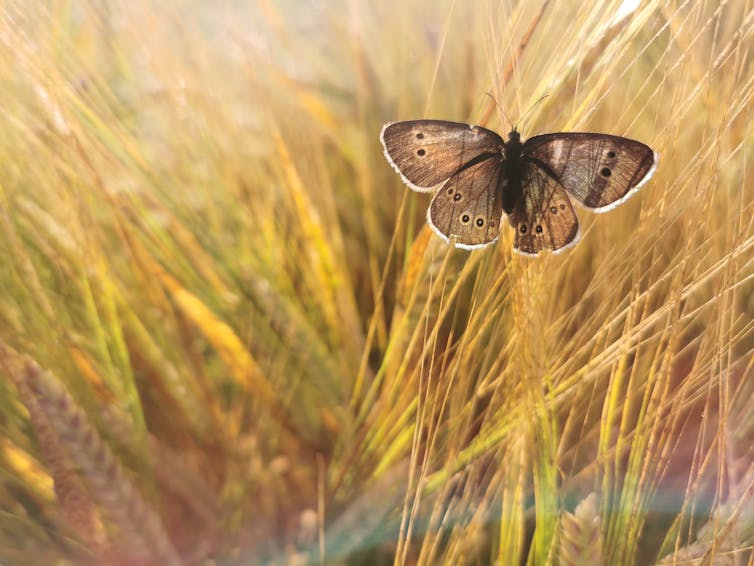The debate about pesticides often gets polarised, pitching farmers against consumers.

Pesticides threaten humans, wildlife and our environment. Food production must change.
But farmers are already pushed to their margins. Organic agriculture produces less food and requires more land. An immediate end to pesticide use will likely cause productivity to drop and prices to soar.
There’s no simple answer that makes pesticides right or wrong – context is key.
“Farmers want to produce food in a healthy environment as it makes it easier for us to operate,” says David Lord, a farmer in Essex, England. “But when we’re forced to produce so close to the cost of production, people are existing on such fine margins, they can’t invest in the things they need to, and they’re just pushed to farm in a way they don’t want to.”
The debate about pesticides often gets polarised, pitching farmers against consumers. But that doesn’t capture the nuance or prioritise trust in scientific evidence. There’s a common ground that can be explored by identifying wins for both people and biodiversity that share agricultural landscapes.
For ten years, I’ve studied pollinators, such as bees, hoverflies and butterflies – all beneficial species that are harmed by intensive agricultural practices. I’ve learned that protecting these species, begins with engaging, inspiring and empowering people.
That engagement starts with sensitive and genuine conversations with farmers that can sometimes be uncomfortable but can lead to exciting opportunities for change. Communication also helps researchers like me to identify trailblazers who can inspire and empower others.
“I have huge admiration for organic farmers, they are so limited in what they can do and they have to be really innovative,” says Lord, who I interviewed for this article.
He spends a lot of time talking to other farmers, visiting farms and seeing how other people are developing more sustainable farming practices. Over the last 12 years, he has started reducing his pesticide use and increasing the diversity of crops he plants.
“It was just a vicious circle. We looked ahead and thought it’s not going to get any better, we need to do something differently. Luckily, there was a group of farmers out there already doing things, we learned from them and thought this could work for us.”
Lord’s actions were not just a response to poor profit and environmental conditions. They represent an individual’s ability to challenge the status quo and change.
My colleagues and I have previously proposed that we should monitor pesticides more like pharmaceuticals. Perhaps we should treat farmers like medics. Their job is to treat diseases, but they have a fundamental duty of care to their patients – our landscapes.
Pesticide use is complex, and so are the ways these chemicals influence the ecosystem. Farmers – and pesticide use – should not be reduced to one type.
Changing farming practices is a challenge, but transformation is already happening and much more is possible. Cover cropping, plants grown for soil cover rather than for harvest, can improve soil quality and keep weeds under control – this reduces the need for pesticides and even buffers their use. This practice is promoted by the UK government.
Pesticides easily contaminate the soil, water, air and food chains with detrimental effects. Pollinators are emblematic of the negative consequences of pesticide use, yet scientific findings are inherently variable and depend on the context of a farming situation. Progress depends on rigorous, objective research. We almost always need to know more.
Science will continue to advance farming through, for example, the development of new pest-resistant varieties and conservation methods. Whatever the approach, basic scientific principles such as objectivity and rigour should always be applied.
Pesticide regulation protects people and wildlife and some of the most dangerous pesticides have been successfully restricted. But the entire regulatory process in the UK (and elsewhere) needs reform. That doesn’t mean, in my view, that the regulatory process should become tighter or more bureaucratic, but rather more realistic and holistic.

We know beneficial species are exposed to multiple pesticides, for example. In bumblebee colonies across Europe, we found an average of eight, and up to 27, distinct pesticide compounds. This type of monitoring once a pesticide has been approved could improve the current single-product, single-use assessment that we have today.
It’s time to consolidate, harmonise and centralise our scientific understanding and approach. This is especially timely as the UK embarks on its pesticide strategy post-Brexit.
Pesticides are part of a much bigger issue – food security in a globalised world and the most impactful change resides with global economic powers. Pesticide use also dominates in commodity crops like cotton, extending the pesticide debate beyond food systems.
As Irish farmer Andrew Bergin told me: “Nature is very valuable until someone has to pay.”
Pesticides can be sustainably reduced, but this requires an approach that reconciles the seemingly conflicting goals of food production, environmental protection, biodiversity and human health.
People and biodiversity share agricultural landscapes. We are all responsible for maintaining their vitality. This includes farmers, consumers and retailers supporting sustainable farming practices, and governments introducing robust policies that facilitate real change to how pesticides are managed.
Jessica Knapp receives funding from the Swedish Research Council Formas (grant 2022-00476) and the Swedish government-funded Strategic Research Area “Biodiversity and Ecosystem Services in a Changing Climate” (BECC).